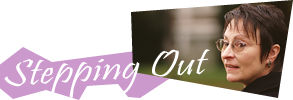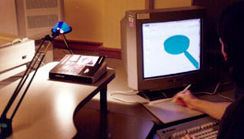
Chapter Four: The Summer Arts Festival and Beyond
Wiley agreed to direct the Summer Arts Festival largely because "I had been a program director for more than 20 years and was ready for a new challenge." She began work in the spring of 1999, and was joined that August by Festival Manager Risa Morgan.
The first Summer Arts Festival was held last July with funds from Tools for Transformation, but a $12 million Campaign for the Arts has been launched by Arts and Sciences to support future festivals and also to raise funds for professorships; student scholarships and fellowships; visiting artists; exhibits and performances; and the Arts Technology Program. More than $3 million has already been raised.
More important, under Wiley's leadership, the festival raised the profile of the arts on campus. "Universities in general and research universities in particular aren't known as makers of art," McCabe says. "But I think we're on the way to changing that. As more and more people become aware of the talent on this campus—among both faculty and students—they will look to us for leadership."

The Laboratory for Animation Arts will benefit from funds raised by the UW's Campaign for the Arts. The Lab is a collaborative effort between the Departments of Art, Computer Science and Music.
And unlike commercial arts festivals, this one had a large educational component—classes whose students performed at the festival, two lecture series and two panel discussions on arts topics, and pre-performance lectures at some of the events.
"We knew that educational events were a natural for our festival, since we are, after all, an educational institution," Wiley says. "But I was amazed at the response to them. At one of the lecture series, for example, we had to keep adding extra chairs every day because more and more people showed up. It seems there is a hunger out there for this kind of information."
Wiley would like the festival to become a year-round presence by offering related courses in the University curriculum. And, remembering her own experiences at Port Townsend and Banff, she also wants to bring in young artists from K-12 for a month long series of classes that would culminate in the festival. She's already working with Christine Goodheart—who was recently hired by the UW Office of Educational Partnerships to create an arts partnership with K-12—to make a start on designing such programs.
And next summer, Wiley will be crossing yet another barrier. The theme for the festival is "Pangaea," the word given to Earth's large land mass before it was separated into continents. It's a theme that lends itself to the inclusion of science, and Wiley plans to do just that. Science at an arts festival? Well, after all, why not? Hannah Wiley has always seen art in the broader context of life. "I've often thought," she muses, "that if we all danced together first thing in the morning and then started having our meetings, there would be so much less conflict in the world."
Nancy Wick, '97, is the editor of University Week, the UW faculty/staff newspaper. In 1998 her Columns cover story on the 1948 Canwell hearings, was named one of the best alumni magazine articles of the year.